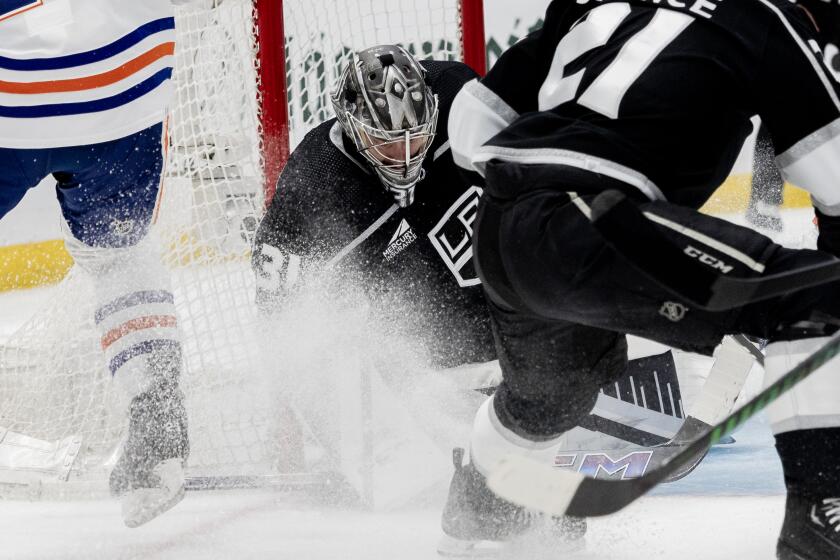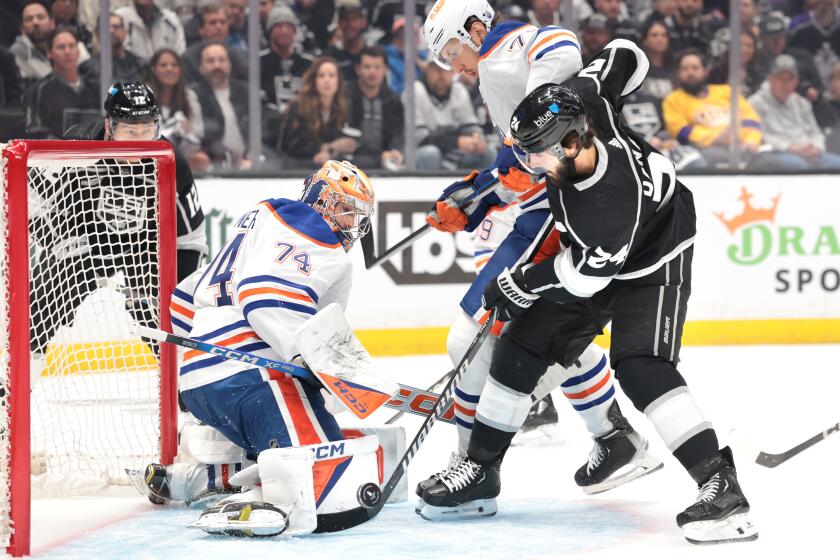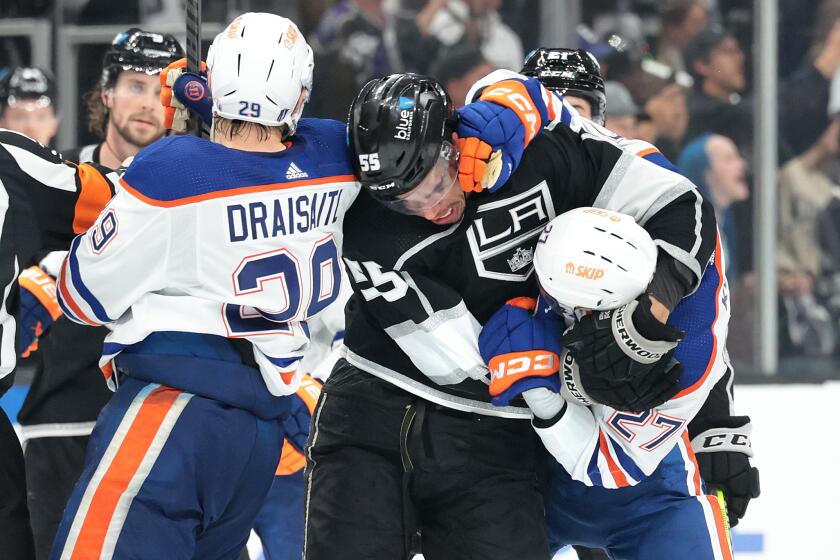Voice of the people
There is something not quite right about Don Cherry.
It’s not his trademark visage -- a pugnacious mug that sprouts from one of his outrageous pink-flowered sport coats and beckons: “Go ahead, take a swing. I dare you.”
It’s not his oft-uttered proclamation: “I’m a redneck.” And it’s not his matter-of-fact self-analysis: “I can go a little insane sometimes with guys who cross me.”
Rather, it has to do with what an adoring Canadian audience senses in the 73-year-old hockey analyst that perhaps he does not. Namely, his sensitivity. Oh, yes, and his vulnerability.
Eh? What? This brutish champion of hockey fights? This insulter of French Canadian and European-born players? This lout who once referred to the talented, then-long-haired Jaromir Jagr as teammate Mario Lemieux’s “daughter?”
Yes, that Don Cherry. The one a poll by the CBC network identified as the seventh-greatest Canadian of all time, ahead of Wayne Gretzky.
North of the border, he’s been called bigger than Oprah and sexier than The Rolling Stones. He’s also been described as racially insensitive and a xenophobic clown.
“He’s the most recognized face in Canada,” says his boss, Joel Darling, executive producer of CBC’s venerable “Hockey Night in Canada” telecast.
In Southern California last week for the CBC broadcast of the Stanley Cup finals between the Ducks and the Ottawa Senators, Cherry now comes to NBC, if only for tonight’s Game 4, appearing with ex-NHL star Brett Hull as a between-periods analyst. An NBC spokeswoman cautiously calls Cherry’s segment “an experiment.”
“A lot of bars across Canada go silent when he comes on TV,” says Hull. “It’s going to be an honor to be on with Don.”
And with Cherry comes his brand of acidic commentary that once earned him a seven-second delay in his popular “Coach’s Corner” segment on CBC.
Though he knows it alienated his Canadian viewers, Cherry picked Anaheim to win the Cup before the playoffs began. Why? “They get in more fights than anyone in the league,” he says. “That intimidates the other teams ... and the fans love it.”
He ridicules the growing talk of banning fighting in the league. “Nobody gets severely hurt” in hockey fights, Cherry contends.
Got a problem with that? Well, you’re wrong, Cherry says.
“There are people who know more about hockey than I do,” he says. “But no one knows hockey like I do.”
The distinction is not lost on his viewers. “I’ve never met anyone who loves the game of hockey as much as he does,” says Darling. “It’s his passion that has made him so successful.”
That popularity has vaulted CBC’s viewership to about 3 million per game for the finals, Darling says. And it is also a reason he and other executives there put up with the “very controversial things” Cherry says.
If Cherry and “Coach’s Corner” co-host Ron MacLean “cross the line, they barely cross it,” Darling says, “not enough to get fired, I guess.” One day, Darling worries, that guess might be wrong. During Wednesday’s Game 2, Darling watched Cherry’s show nervously from CBC’s mobile control-room outside the Honda Center. “This is the most stressful part of our [game] telecast,” he says. “Don can be very demanding.” And unpredictable? “Yes, that too.”
His past transgressions include labeling French Canadians and Europeans as soft players, with a propensity for diving, high-sticking and hiding behind visors, and referring to Winnipeg Jets assistant coach Alpo Suhonen as “dog food.”
In Wednesday’s Coach’s Corner segment, Cherry gives Darling little reason to worry. His only “Cherry moment” comes when he pronounces Ducks goaltender Jean-Sebastien Giguere’s last name incorrectly, with a hard G -- one of many malapropisms that dot his commentaries.
Despite his foibles, or because of them, Cherry is beyond popular in Canada. He is loved.
“I don’t want to sound corny, but Don Cherry is everyman,” says John Shannon, NHL vice president for broadcasting, and Cherry’s former boss at CBC.
Perhaps Cherry’s greatest attribute is that he does not think, says Shannon: “He speaks instinctively. It just comes out.”
Part of Cherry’s attraction, some contend, is that people see a softer side. “Don is a very shy person,” says Darling. “He’s honed his [confrontational persona] for TV, because he knows that’s entertainment and that’s what people want.”
As Cherry settles in to talk about his favorite subject -- hockey -- the off-camera persona emerges. He speaks somberly of a night in Rochester, N.Y. in 1970. “It’s not a story I tell often,” he says. “But it may help someone who reads it.”
A career minor league player, Cherry found himself, at 36, out of hockey and working as a car salesman -- “the world’s worst car salesman,” he says. “I was lying in bed, and I got down on my knees and asked, ‘Is this the end?’ And something told me to quit my job and go down to the Rochester Americans [hockey team] office and tell them I want to make a comeback.”
The Rochester team not only let him but named him coach in midseason. “As soon as I got behind that bench, I knew I was born to coach,” he recalls. In 1974, he became coach of the Boston Bruins, putting him in charge of Bobby Orr, who Cherry says is still “the greatest player ever to put on skates.”
During what Cherry calls “the best five years of my life,” he took the Bruins to consecutive Stanley Cup finals.
But after butting heads with Bruins General Manager Harry Sinden, and later with his bosses at the Colorado Rockies, Cherry gravitated to television in 1980.
He developed an on-air style that included his signature thumbs-up salute and a flamboyant wardrobe -- the latter inspired by his father, Del, a minor league baseball player with a penchant for fine clothes.
Cherry also attempted to emulate his father on the baseball field, playing center field in a Dodgers rookie camp in the early 1950s. A broken shoulder in one baseball game wrecked his chance at making it as an NHL player, his lifelong dream.
“I disappointed my dad,” he says softly.
His father died before he could see Cherry evolve into a Canadian icon.
“I never thought I’d be in this position,” says Cherry. “I have a ninth-grade education.”
Why is he so universally liked?
“I don’t know,” he answers without hesitation.
If Canadians do love him for his character flaws, Cherry acknowledges he’s got plenty of those to go around.
“I’m too honest,” he says. “I have a violent temper. It’s a heck of a way to live, but I can’t change.”
More to Read
Go beyond the scoreboard
Get the latest on L.A.'s teams in the daily Sports Report newsletter.
You may occasionally receive promotional content from the Los Angeles Times.






